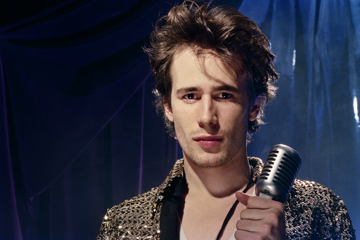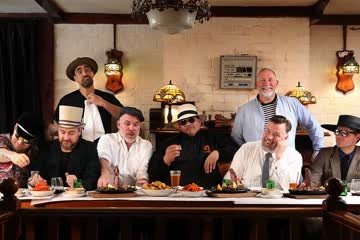Jasper Jones Author Craig Silvey On Bringing His Modern Australian Classic To The Screen
"Cinema is just so moving. It draws you in and hypnotises you."
The life of a writer can be a solitary one, so the past year has been a major change of pace for Craig Silvey. In 2016, the West Australian author of the modern classic Jasper Jones, enjoyed not one, but two new productions of playwright Kate Mulvany's stage play adaptation of his bestseller. Perhaps even more significantly, Silvey swapped his novelist's hat for that of a screenwriter's, translating his book into a film iteration, which has now been made into a full-length feature starring Aussie acting royalty Hugo Weaving and Toni Collette.
It's a career sidestep he's found to be revelatory. "Cinema is just so moving. It draws you in and hypnotises you," he smiles. "It has been a life-changing experience for me. Being part of such an enormous team and being right there, with the thrill and pressure on set, it's infectious. There's something unique about that environment - it bonds people very quickly with this great sense of collective purpose. It's just like a big family, and I loved that. I absolutely loved it."
Silvey's multi-award-winning book, published in 2009, tells the story of Charlie Bucktin (played by Levi Miller), a meek, well-behaved, book-smart 14-year-old boy living in the fictional WA town of Corrigan in the mid-1960s. He becomes an unlikely ally with the local pariah, an outcast indigenous boy named Jasper Jones (Aaron L McGrath). Together they embark on a search for the murderer of a local girl, uncovering truths along the way that change both boys forever.
Director Rachel Perkins, best known for her comedy-musical movie Bran Nue Dae, initiated the process of transporting Silvey's characters from the page to the screen. It was a collaboration that was both affirming and intense. "Rachel is so passionate about this story, and she brings different elements to it which has been unexpected. They're defined, interesting, fascinating, but ultimately, they're ideas that are absolutely in the service of the narrative, which she's just as passionate about as I am," Silvey shares. "We were as obsessed about this film adaptation as each other. We lived with each other on set - we shared a little chalet where we were filming on location - and we just talked constantly about the characters, about what tweaks we could make to focus the storytelling, looking through the rushes, talking about what was working and what wasn't. It was Jasper Jones, dawn till dusk."
Don't miss a beat with our FREE daily newsletter
"It was all about Jasper; this kid emerged for me and there was something critical and urgent about him. Something very distant, and yet very intriguing. I just knew I wanted to know him."
It was also something of a baptism of fire for Silvey, who was largely untested as a scriptwriter. "I didn't know what to expect - I think it's better to go into these processes with no preformed expectations," he reflects. "It wasn't always easy, as you're working to hard deadlines, but there's also a lot of support. Even if the stress levels were high at times, being on set, seeing how passionate people are is incredibly motivating."
Among those passionate colleagues, perhaps the most influential on Silvey were the actors giving voice to the characters he has lived with for almost a decade. "On set, I tried to stay focused on how the scenes were taking shape, whether the dialogue was functional, whether the storytelling was rich and alive enough. But it's hard to ignore the significance of having Hugo [Weaving] and Toni [Collette] bringing these characters, who I know inside out, to life in a way that allowed me to see them afresh," Silvey recalls. "We had Hugo the first three days of the entire shoot, and there's a very important confessional scene for his character which just happened to be one of the scenes I was most worried about. But he did that scene in just one take, it was extraordinary. Afterward, we dried our eyes and said, 'Well, there's not much else we can do here,' and that was that. For me, it was a very profound moment. To have an actor of his skill bring such a level of depth and complexity to those words was really quite breathtaking."
While Silvey admits to being a touch starstruck on set, it's not hard to see why this film adaptation has attracted such a well-heeled cast. Jasper Jones has been likened to Harper Lee's seminal American classic, To Kill A Mocking Bird, and much like that Pulitzer Prize-winning Bildungsroman, Silvey's novel also questions ideas of racial prejudice, societal injustice and the loss of innocence. However, it's not these specific similarities that hold the greatest synergy with To Kill A Mockingbird, Silvey believes. "Both these stories are about compassion. They both deal with learning to walk in someone else's shoes, understanding someone else's story, disassembling predetermined notions about what other people are, what their cultures are, where they come from, and most importantly, what their intentions are," he explains. "And that's a simple, but very universal subtext: the importance of empathy in learning the truth about people, and how absolutely necessary that is to living harmoniously."
It's been a long journey for Silvey, from the first, ineffable idea of Jasper entering his mind for the first time, almost ten years ago, to the fully hewed, thoroughly realised vision of him that appears in the film. The book is now considered an important monument to Australia's complex and somewhat ignominious social past. However, looking back on the novel's development, Silvey is surprisingly humble about its cultural significance. "I didn't set out to write a work of Southern Gothic fiction. It was never my intention to capture the social mood of a particular period, necessarily. Initially, it was about tracing this character. It was all about Jasper; this kid emerged for me and there was something critical and urgent about him. Something very distant, and yet very intriguing. I just knew I wanted to know him — I wanted to know why he was occupying my thoughts so much. But for a long time, I couldn't access him," Silvey muses.
"It wasn't until I had Charlie, who I guess is a kind of exaggerated proxy of myself, that I could finally reach him. So telling this story has always felt deeply personal for me. In the book, the narrative is projected through Charlie's eyes, but the reason it's called Jasper Jones, is because he's the most essential character. It's funny, making this film has been interesting because in terms of screen time, Jasper isn't actually in that many scenes, physically at least. But he's always a presence in the whole story. He's important."
Madmen Entertainment presents Jasper Jones, in cinemas nationwide from 2 Mar.







